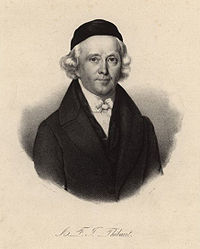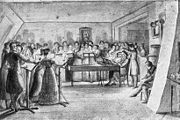
Anton Friedrich Justus Thibaut
Encyclopedia

Jurist
A jurist or jurisconsult is a professional who studies, develops, applies, or otherwise deals with the law. The term is widely used in American English, but in the United Kingdom and many Commonwealth countries it has only historical and specialist usage...
and musician
Musician
A musician is an artist who plays a musical instrument. It may or may not be the person's profession. Musicians can be classified by their roles in performing music and writing music.Also....* A person who makes music a profession....
.
Early life
He was born at HamelinHamelin
Hamelin is a town on the river Weser in Lower Saxony, Germany. It is the capital of the district of Hamelin-Pyrmont and has a population of 58,696 ....
, in Hanover
Electorate of Hanover
The Electorate of Brunswick-Lüneburg was the ninth Electorate of the Holy Roman Empire of the German Nation...
, the son of an officer in the Hanoverian army, of French Huguenot
Huguenot
The Huguenots were members of the Protestant Reformed Church of France during the 16th and 17th centuries. Since the 17th century, people who formerly would have been called Huguenots have instead simply been called French Protestants, a title suggested by their German co-religionists, the...
descent. After school in Hameln and Hanover, Thibaut entered the University of Göttingen as a student of jurisprudence
Jurisprudence
Jurisprudence is the theory and philosophy of law. Scholars of jurisprudence, or legal theorists , hope to obtain a deeper understanding of the nature of law, of legal reasoning, legal systems and of legal institutions...
, went from there to Königsberg
Königsberg
Königsberg was the capital of East Prussia from the Late Middle Ages until 1945 as well as the northernmost and easternmost German city with 286,666 inhabitants . Due to the multicultural society in and around the city, there are several local names for it...
, where he studied under Immanuel Kant
Immanuel Kant
Immanuel Kant was a German philosopher from Königsberg , researching, lecturing and writing on philosophy and anthropology at the end of the 18th Century Enlightenment....
, and afterwards to the University of Kiel
University of Kiel
The University of Kiel is a university in the city of Kiel, Germany. It was founded in 1665 as the Academia Holsatorum Chiloniensis by Christian Albert, Duke of Holstein-Gottorp and has approximately 23,000 students today...
, where he was a fellow-student with Niebuhr
Barthold Georg Niebuhr
Barthold Georg Niebuhr was a Danish-German statesman and historian who became Germany's leading historian of Ancient Rome and a founding father of modern scholarly historiography. Classical Rome caught the admiration of German thinkers...
. Here, after taking his degree of doctor of laws, he became a Privat-dozent.
Jurist's life
In 1798 he was appointed extraordinary professor of civil lawCivil law (legal system)
Civil law is a legal system inspired by Roman law and whose primary feature is that laws are codified into collections, as compared to common law systems that gives great precedential weight to common law on the principle that it is unfair to treat similar facts differently on different...
, and in the same year appeared his Versuche über einzelne Theile der Theorie des Rechts (1798), a collection of essays on the theory of law, of which by far the most important was entitled Über den Einfluss der Philosophie auf die Auslegung der positiven Gesetze, wherein he sought to show that history without philosophy
Philosophy
Philosophy is the study of general and fundamental problems, such as those connected with existence, knowledge, values, reason, mind, and language. Philosophy is distinguished from other ways of addressing such problems by its critical, generally systematic approach and its reliance on rational...
could not interpret and explain law. In 1799, he published his Theorie der logischen Auslegung des römischen Rechts, one of his major works. In 1802 he published a short criticism of Feuerbach
Paul Johann Anselm Ritter von Feuerbach
Paul Johann Anselm Ritter von Feuerbach was a German legal scholar. His major work was a reform of the Bavarian penal code which became a model for several other countries.-Biography:...
's theory of criminal law
Criminal law
Criminal law, is the body of law that relates to crime. It might be defined as the body of rules that defines conduct that is not allowed because it is held to threaten, harm or endanger the safety and welfare of people, and that sets out the punishment to be imposed on people who do not obey...
, which recalls in many ways the speculations of Jeremy Bentham
Jeremy Bentham
Jeremy Bentham was an English jurist, philosopher, and legal and social reformer. He became a leading theorist in Anglo-American philosophy of law, and a political radical whose ideas influenced the development of welfarism...
. The same year appeared Über Besitz und Verjahrung, a treatise on the law of possession and the limitation of actions.
In 1802 Thibaut was called to Jena, where he spent three years and wrote, in Friedrich Schiller
Friedrich Schiller
Johann Christoph Friedrich von Schiller was a German poet, philosopher, historian, and playwright. During the last seventeen years of his life , Schiller struck up a productive, if complicated, friendship with already famous and influential Johann Wolfgang von Goethe...
's summer-house, his chief work, System des Pandektenrechts (1803), which ran into many editions. The fame of this book results from its being the first modern complete compendium of the subject, distinguished alike by the accuracy of its sources and the freedom and unpedantic manner in which the subject is handled. It is, in effect, a codification of the Roman law
Roman law
Roman law is the legal system of ancient Rome, and the legal developments which occurred before the 7th century AD — when the Roman–Byzantine state adopted Greek as the language of government. The development of Roman law comprises more than a thousand years of jurisprudence — from the Twelve...
as it then obtained in Germany, modified by canon law
Canon law
Canon law is the body of laws & regulations made or adopted by ecclesiastical authority, for the government of the Christian organization and its members. It is the internal ecclesiastical law governing the Catholic Church , the Eastern and Oriental Orthodox churches, and the Anglican Communion of...
and the practice of the courts into a comprehensive system of Pandect law
Pandects
The Digest, also known as the Pandects , is a name given to a compendium or digest of Roman law compiled by order of the emperor Justinian I in the 6th century .The Digest was one part of the Corpus Juris Civilis, the body of civil law issued under Justinian I...
. At the invitation of the grand-duke of Baden, Thibaut went to Heidelberg to fill the chair of civil law and to assist in organizing the university; and he never left the town, though in later years, as his fame grew, he was offered places at Göttingen, Munich and Leipzig. His class was large, his influence great; and, except Gustav Hugo
Gustav Hugo
Gustav von Hugo was a German jurist.He was born at Lörrach in Baden. From the gymnasium at Karlsruhe he passed in 1782 to the University of Göttingen, where he studied law for three years. Having received the appointment of tutor to the prince of Anhalt-Dessau, he took his doctor's degree at the...
and Savigny, no civilian of his time was so well known. In 1814 appeared his Civilistische Abhandlungen, of which the principal was his famous essay, the parent of so much literature, on the necessity of a national code for Germany (vide infra).
Another of Thibaut's works was his essay on the necessity of a code for Germany (Über die Nothwendigkeit eines allgemeinen bürgerlichen Rechts für Deutschland), which was inspired by the enthusiasm of the war of Liberation
War of liberation
A War of liberation is a conflict which is primarily intended to bring freedom or independence to a nation or group. Examples might include a war to overthrow a colonial power, or to remove a dictator from power. Such wars are often unconventional...
and written in fourteen days. Thibaut himself explained in the Archiv für die civilistische Praxis, in 1838, the origin of this memorable essay. He had realized the change denoted by the march of German soldiers to Paris
Paris
Paris is the capital and largest city in France, situated on the river Seine, in northern France, at the heart of the Île-de-France region...
in 1814, and the happy future opened up for Germany. The system of small states he hoped and believed would continue; for the big state he considered crushing to the life of the individual and harmful as concentrating the "warm life" of the nation in one central point. In his judgment the only unity practicable and needful for Germany was that of law; and for this he urged all the German governments to labour. The essay was as much a condemnation of the entire state of jurisprudence as an argument for codification; it was a challenge to civilians to justify their very existence. Savigny took up the challenge thus thrown down when he wrote Über den Beruf unserer Zeit für Gesetzgebung und Rechtswissenschaft (1814); and a long controversy as to points not very clearly defined took place. The glory of the controversy belonged to Savigny; the real victory rested with Thibaut.
In 1819 he was appointed to the upper house of the newly constituted Baden parliament. He was also made member of the Scheidungsgericht (divorce court). In 1836 Thibaut published his Erorterungen des romischen Rechts. One of his last works was a contribution in 1838 to the Archiv für die civilistische Praxis, of which he was one of the editors (see below). Thibaut married, in 1800, a daughter of Professor Ahlers of Kiel. He died after a short illness, at Heidelberg.
Legacy

Giovanni Pierluigi da Palestrina
Giovanni Pierluigi da Palestrina was an Italian Renaissance composer of sacred music and the best-known 16th-century representative of the Roman School of musical composition...
and the early composers of church music were his delight; and in 1824 he published, anonymously, Über die Reinheit der Tonkunst (Purity of Music), in which he eulogized the old music, especially that of Palestrina. He was an ardent collector of old compositions, and often sent young men to Italy, at his own expense, to discover interesting musical manuscripts. Among the masters of German prose, too, Thibaut has a place. His style, though simple, is richly expressive.
The framers of the new German civil code (Bürgerliches Gesetzbuch) in 1879 owed the arrangement of their matter in no small degree to Thibaut's method and clear classification, but beyond this, the code, based on the civil law of the several German states, which was adroitly blended by the usus pandectarum into an harmonious whole, does not reflect his influence. He was one of the earliest to criticize the divisions found in the Institutes, and he carried on with Gustav Hugo a controversy as to these points.
Thibaut's legal work was soon superseded by that of his successor, Karl Adolf von Vangerow (1805–1870), and his textbooks fell out of use. John Austin, who owed much to him, describes him as one "who for penetrating acuteness, rectitude of judgment and depth of learning and eloquence of exposition, may be placed by the side of Friedrich Carl von Savigny
Friedrich Carl von Savigny
Friedrich Carl von Savigny was one of the most respected and influential 19th-century jurists and historians.-Early life and education:...
, at the head of all living civilians."

